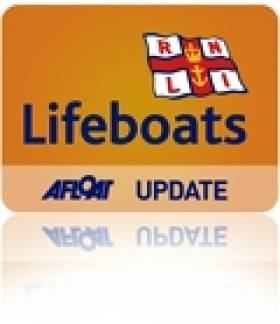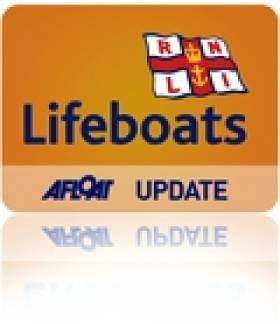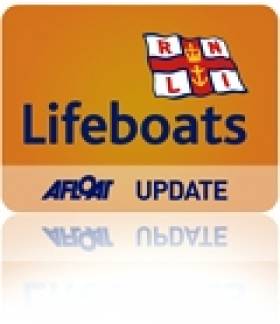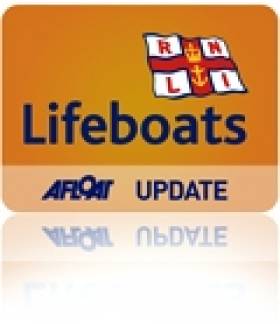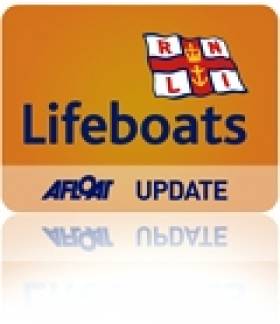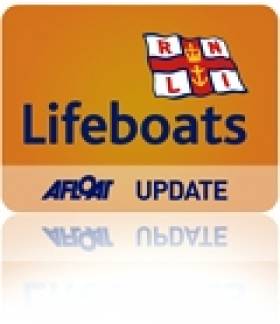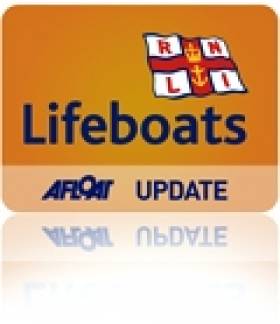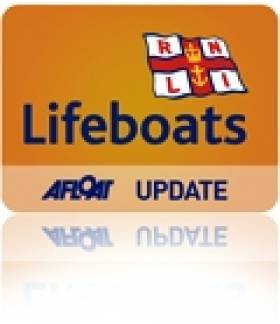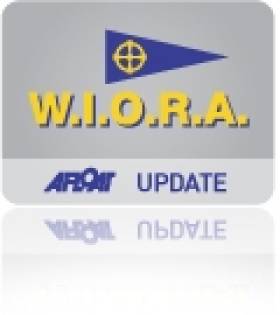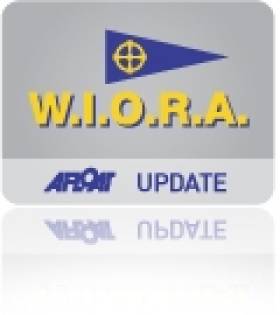Displaying items by tag: Clifden
Artist To Auction 'Regatta at Roundstone' Oil Painting For Clifden RNLI
#rnli – Fans of master artist Kenneth Webb will have the opportunity to get their hands on a new painting he will start during Clifden Arts week and auction to raise funds for Clifden RNLI.
Work on the 20'x 24' oil painting which will depict a local scene from the 'Regatta at Roundstone' will commence during Kenneth's first 'One Man Show' at The Gallery in the Alcock and Brown Hotel in Clifden from 2pm on Saturday 20 September. Entry fee is €10.
Kenneth will start the oil painting during a live painting demonstration before taking it away and finishing it to master standard after the auction.
Dr Niall Dolan of Dolan's Art Auction House will preside over the auction at 4pm. For those who can't attend on the day there will be options for bidding via telephone or online by contacting the hotel.
Speaking ahead of the event, Anthony Hiney, RNLI Community Fundraising Manager said the charity was delighted the master artist was donating a new Connemara painting: 'This is a great opportunity for Kenneth Webb's fans and locals alike to see him at work, hear his stories and ask questions. His generosity to charity is well known and we are thankful that the proceeds from this new piece of work will help our volunteers at Clifden RNLI to save lives at sea.'
Now in his 88th year, and 60 years after first coming to Connemara, Kenneth will also have paintings from his last two London exhibitions and the first showing of his work for his next London show on exhibit.
London born, Kenneth and his wife Joan first came to Clifden in 1950 after escaping college and spending a summer holiday in the west. Between 1960 and 1980 he returned to run summer schools and created The Irish School of Landscape Painting.
During this time, in 1972, Joan and he purchased their cottage in Ballinaboy. It was there, starting in 1990 and continuing to this day, that he developed The Art Centre. Over his years in the area, Kenneth has exhibited local paintings but this will be his first 'One Man Show'.
Clifden RNLI Now Trialling All-Weather Lifeboat
#RNLI - Clifden RNLI has put an all-weather lifeboat on service for a trial period, more than a year after the move was confirmed.
The Pride and Spirit has come from the existing RNLI fleet and will be on trial for 12 months operating in conjunction with the existing inshore lifeboat service at the station.
Following the trial, the RNLI will make the call on establishing a permanent all-weather lifeboat service for Connemara's largest town.
A decision was made back in April 2012 by the charity’s trustees, with the recommendation of its operations committee, that the volunteer crew at Clifden would take delivery of a carriage launched Mersey-class lifeboat, following an in-depth review of lifeboat cover in the area.
Since that announcement, there has been an intensive period of preparation for the volunteer lifeboat crew, which has included months of training at Clifden and visits to the RNLI College in Poole.
There are currently four coxswains, four mechanics, four navigators and 16 all-weather lifeboat crew trained and ready to respond to call outs aboard the Pride and Spirit.
Clifden RNLI lifeboat operations manager John Brittain said he is proud of the additional lifeboat service at the West Co Galway station.
"This is a great day for everyone involved with Clifden RNLI. The new lifeboat will allow us to provide lifesaving cover in all weathers up to 100 miles off the Connemara coast.
"We have received great support and encouragement from everyone involved with the RNLI at both Swords and Poole. To see this group of volunteers coming together and training with the all-weather lifeboat and now going on service is a proud day for us all."
RNLI divisional operations manager Owen Medland added: "Since the announcement back in April 2012, the enthusiasm at the station has been wonderful and I am delighted that after months of training, the volunteer crew now has an all-weather lifeboat on service.
"We are continuing to work hard to establish a temporary shore facility which shall allow us to maintain Pride and Spirit ashore."
All-weather lifeboats can be operated safely in all-weather while inshore lifeboats usually operate closer to shore, in shallower water, close to cliffs, among rocks or even in caves.
Introduced as the RNLI’s first fast-carriage lifeboat, the Mersey class has a top speed of 17 knots. Designed to operate from a carriage, slipway or lie afloat, this class of lifeboat is also capable of being self-righted in challenging conditions.
The Mersey, which carries a lifeboat crew of six, has been in service for many years and shall eventually be replaced by the new Shannon-class lifeboat.
Last year, Clifden RNLI launched eight times bringing seven people to safety. Of those launches, two services were in the dark. In all, some 82 service hours were spent at sea.
A lifeboat station was established in Clifden in early 1988, and the station currently operates two inshore lifeboats.
Clifden RNLI Lifeboat Rescues Four Fish Farmers in Extreme Weather
#rescue – Clifden RNLI in county Galway has rescued four fish farmers after they got into difficulty in extreme weather conditions this afternoon.
The volunteer lifeboat crew was requested to launch their inshore Atlantic 85 lifeboat at 1.44pm today (Wednesday 12 February) following a request by Malin Head Coast Guard to go to the assistance of four fish farmers who were stranded at the mouth of Clifden Bay.
With the weather conditions deteriorating, the men who were working in the bay, made the call for help.
The Irish Coast Guard helicopter Rescue 118 from Sligo was also tasked.
There were westerly gusts at the time and the tide was ebbing creating a large sea state.
Due to the adverse weather conditions, the lifeboat helmed by Bernard Whelan and with crew members Kenneth Flaherty, Robert King and Thomas Davis onboard, launched from the calm side of the beach in the shelter of the shore and proceeded westward out to Clifden Bay.
Arriving on scene, the crew observed three of the fish farmers on a 16ft boat which was tied to a fish cage. The Clifden RNLI crew transferred the three men from the vessel onto the lifeboat before taking the fourth fish farmer off the large cage. The lifeboat then returned the four men safely to shore.
Speaking following the call out, Saul Joyce, Clifden RNLI Deputy Launching Authority said: 'This was a challenging call out given the gusty weather conditions the lifeboat crew was presented with today. The four casualties who are experienced fish farmers were working when the stormy conditions took over and they made the right decision to call for help. The crew used their skill and training to good effect and we are delighted to have brought all four safely back to shore.'
Clifden RNLI Names New Atlantic 85 Lifeboat
#RNLI - Clifden RNLI officially named its new Atlantic 85 lifeboat, Joyce King, at its station in the Connemara coastal town of Clifden in a special ceremony yesterday (Saturday 9 November).
John Coyle, chairman of the Irish council of the RNLI, accepted the lifeboat on behalf of the institution before handing her over into the care of Clifden Lifeboat Station.
Coyle paid tribute to the donor John Charles King, who had generously funded the lifeboat through a gift left in his will.
King - who hailed from Lincolnshire in England - funded the lifeboat, which has been in service in Clifden since June, in memory of his wife Joyce.
Jackie O’Grady, chair of the Clifden RNLI lifeboat management group and a former honorary secretary at the station, then officially named the lifeboat during the ceremony.
The new state-of-the-art Atlantic 85 lifeboat, at 8,4m in length and weighing 1.8 tonnes, was introduced into the RNLI fleet in 2005. Improvements on its predecessor include a faster top speed of 35 knots, radar, provision for a fourth crew member and more space for survivors.
Since the new lifeboat went into service in Clifden, it has had seven call-outs and 20 people have been brought to safety.
Clifden RNLI lifeboat operations manager John Brittain said the naming ceremony and service of dedication was a special occasion in the history of the lifeboat station, adding that the volunteer crew was grateful to King for his generous legacy.
He said the RNLI could not operate its lifeboats without the dedication of volunteer lifeboat crew.
"The 37 men and women currently on our crew in Clifden give 100% at all times. Their commitment and on-going attendance for training both here and at the lifeboat college means that they are highly proficient in the operation of their lifeboats.
"Further testament of the dedication of the crew is their knowledge that they may risk their own lives in the service of others. There is nothing greater that a person could offer and they deserve nothing less than the best lifeboat, equipment and training that money can buy."
Brittain went on to pay tribute to the vital support provided by the volunteers who support the crew.
"However, the lifeboat crew and I are only one part of this station. I must mention our operation team, supporters and fundraisers who volunteer their time and efforts and do so much for Clifden RNLI. These are people of all ages who give what time and money they can – thank you."
The RNLI established a lifeboat station in Clifden in early 1988 when a C-class lifeboat was put on service for one season’s evaluation. The following year Clifden RNLI became fully operational as a summer season only lifeboat station.
In 1992 part of a building used for housing the lifeboat was demolished and a new purpose-built building was constructed in order to provide adequate facilities for the lifeboat and crew. As well as providing an area for the C-class lifeboat and launching vehicle, it included a workshop and crew facilities.
In 1997, an Atlantic 21 lifeboat was placed on service and a new boathouse for the lifeboat and a tractor was completed in August 1998. A new Atlantic 75 B-class lifeboat was placed on service in 1999 and remained stationed until June when it was replaced by the Atlantic 85.
Fast, manoeuvrable and reliable, the B-class operates in rough weather conditions, capable in daylight up to force seven and at night, to force six winds. The new lifeboat, an Atlantic 85, is the latest version of the B-class.
A crowd of well-wishers turned up to see the lifeboat officially named with a bottle of champagne poured over the side of the boat before it launched at the end of the ceremony.
Clifden RNLI lifeboat crew member David Barry welcomed guests and opened proceedings while Lavinia Joyce from the Clifden RNLI fundraising branch delivered the vote of thanks. Father James Ronayne and Reverend Stan Evans lead the service of dedication.
Clifden RNLI Crewman Shares Lifesaving Skills On Danish Lifeboat
#RNLI - Clifden RNLI volunteer crewmember James 'Digger' Mullen was selected from thousands of RNLI volunteers to represent the charity last month on a European Lifeboat Crew Exchange in Denmark.
Lifeboat crew from seven European countries were invited on a week-long programme designed to improve maritime search and rescue (SAR) responses and help to prevent loss of life in Europe’s waters.
The initiative is run by the International Maritime Rescue Federation (IMRF) and comprises simulated search and rescue exercises as well as training modules, which were organised by the Danish Rescue Coast Service.
During an exhaustive week, Mullen had an opportunity to work with Danish lifeboat crew from three lifeboat stations and took part in various challenging scenarios with the Danish navy and the rescue helicopter crews.
Mullen, from the Clifden lifeboat in Co Galway, worked alongside lifeboat crew from Holland, Norway, Finland, Sweden, Iceland and Germany from a base in Hirtshals, a town on the north coast of Denmark. The area the local lifeboat crew operated in was completely different to Clifden with no breakers or islands off the coastline.
The group went to sea on Hirtshals lifeboat station’s two rescue boats: a 23m all-weather boat and a 9m fast response boat (FRB) that reaches speeds of up to 30 knots. The group travelled down the coast 40 miles to meet up with Thorup Strand lifeboat station and their 9m jet rescue boat Hurricane, which reaches speeds of 40 knots.
The team carried out a medical evacuation with a navy patrol boat and refueled the lifeboat at sea from the navy ship, while both vessels were travelling at 8 knots. The crew also took part in a joint lifeboat helicopter exercise; a common occurrence for lifeboat crew on Irish waters.
The week was full of simulated rescues and boat handling, with all the lifeboat crewmembers swapping their knowledge and feedback on what they found worked in different types of emergency scenarios in their own areas.
The final two days of the exercise were spent with the Danish navy and the team attended naval training school. They were taught how to board a life raft in big seas, how to abandon ship from a six metre bridge, and how to recover unconscious casualties into a liferaft.
At the end of the training there was a mass exercise. The pool was darkened, filled with smoke, wind, rain, lighting and thunder, and they evacuated their ship to find an unconscious casualty and recover them on to a nearby liferaft.
The final exercise was held in the navy fire fighting/damage control training centre. The group were taken onto a simulated navy ship and had to stem a growing ingress of water which was flowing in through numerous breeches and ultimately save the ship from sinking. This was to be done with timber, rubber mats, wedges, buckets, ropes, hand saws and hammers. In the freezing water which was pouring into the ship, the team all worked together to try and stem the flow and save the ship.
Commenting on the week, Mullen said: “I am extremely grateful that this exchange programme has been made possible through EU funding on the Lifelong Learning Programme. Our group of lifeboat crew from across Europe shared experiences with each other and listened to everyone’s feedback.
"Though we all spoke difference languages, we generally all do what we do the very same way, just using different boats with different equipment. Saving lives at sea is the same in every language."
RNLI divisional operations manager Owen Medland added: “We were delighted to have an RNLI volunteer crewmember on this exchange. The experience James has had in his role operating lifeboats off the west coast of Ireland is invaluable and we were keen to share this knowledge with a wider search and rescue community.
"There are always things we can learn from each other and it promotes a wider understanding of how saving lives at sea has evolved and continues to evolve due to improved equipment and continuing training.”
Clifden RNLI Upgrade Inshore Lifeboat to New Atlantic 85
#rnli – Clifden RNLI have this week taken delivery of a new Atlantic 85 lifeboat at the station. The lifeboat is named Joyce King and will be replacing the Atlantic 75 lifeboat that has been on service in the Galway lifeboat station since 1999. This is not the only new arrival expected at Clifden as the crew also await the delivery of an all-weather lifeboat, which will be trialled there for a year, to work alongside an inshore lifeboat.
The Atlantic 85 lifeboat has some improvements on its predecessor and the lifeboat crew have been spending most of the week familiarising themselves with the new boat. The new lifeboat can operate in conditions up to a force seven and further to the Atlantic 75, allows for a fourth crewmember, more survivors and more kit onboard. The vessel is powered by two 115 horsepower engines, is composed of a strong hull and has a top speed of 35 knots. The added radar allows the crew to operate more effectively in poor visibility and to locate vessels in difficulty faster.
It carries a full suite of communication and electronic navigation aids, including VHF radio, as well as a searchlight, night vision equipment and illumination paraflares for night-time. Four out of ten RNLI callouts occur in the hours of darkness.
In keeping with the RNLI practice of ensuring that lifeboats are kept maintained to the highest standards and are routinely refitted every few years, Clifden RNLI's Atlantic 75 will go on to serve at another lifeboat station in Enniskillen. In the fourteen years the Benjamin Downing Fairbridge Atlantic 75 lifeboat was at Clifden RNLI it launched 115 times and brought 97 people to safety.
The new lifeboat has been made possible by a legacy from Mr John Charles King of Lincolnshire in England. Mr King passed away in 2009 and on his death requested that a lifeboat be named Joyce King in memory of his wife. There are no surviving relatives and very little is known of Mr and Mrs King. Through their generous bequest they have funded the Clifden lifeboat which will be put to use launching off the west coast of Ireland to those in peril on the sea.
Commenting on the arrival of the new Atlantic 85 lifeboat at Clifden, Owen Medland RNLI Divisional Operations Manager said, "We've had a very busy week here with all the RNLI crew and station management. The arrival of a new lifeboat is always an exciting time for any station and it is accompanied by an intensive week of training and familiarisation with the new boat by all concerned. This is a particularly challenging part of the coastline and this new lifeboat will assist the crew in their work saving lives at sea and assisting those in difficulty."
A date for the arrival of the all weather lifeboat to be trialled at Clifden RNLI has yet to be confirmed and will be announced in due course by the charity
Clifden RNLI Rescues Inishbofin Casualty
#RNLI - Clifden RNLI‘s Atlantic 75 lifeboat launched on Thursday afternoon 6 June in response to a coastguard request to assist in the transfer of a casualty from Inishbofin Island in Co Galway to the mainland.
A 61-year-old man, who was visiting the island, had sustained significant facial injuries following a fall from a bicycle. Clifden RNLI lifeboat helm James Mullen, a full-time paramedic, was able to assess the casualty’s injuries on arrival.
Having checked him over, he and the other voluntary crew members transported the man quickly and safely to Cleggan pier and an awaiting ambulance, which then transferred him to University College Hospital Galway for further treatment.
Mullen said of the launch: “I was glad to be available to assist on this callout to Inishbofin today. Our swift launch and recovery time is vital regarding our local islands, and while the casualty’s injuries were not life threatening, they were certainly serious enough to warrant urgent medical attention.”
Inishbofin Island is located five miles off the Connemara coast and is a popular summer holiday destination.
The Clifden RNLI lifeboats have undertaken many launches to and exercises around the island, including with the island’s main ferry. And as previously reported on Afloat.ie, the station was recently chosen to trial the new Mersey class all-weather lifebo
Clifden RNLI To Trial New All-Weather Lifeboat
#RNLI - The RNLI has announced that Clifden lifeboat station in Co Galway is to receive an all-weather class lifeboat for a trial period of 12 months to operate in conjunction with the existing inshore lifeboat service.
The decision, which will see the volunteer crew take delivery of a carriage-launched Mersey class lifeboat, was made this week when the charity’s trustees accepted the recommendation of its operations committee. It follows an in-depth review of lifeboat cover in the area.
The RNLI carries out a five-yearly review of lifeboat stations, looking at the incidents they launch to and the changing pattern of marine activities to ensure the existing and future lifeboat coverage is appropriate.
All-weather lifeboats can be operated safely in all weather conditions while inshore lifeboats usually operate closer to shore, in shallower water, close to cliffs, among rocks or even in caves.
Introduced as the RNLI’s first fast-carriage lifeboat, the Mersey class has a top speed of 17 knots. Designed to operate from a carriage, slipway or lie afloat, this class of lifeboat is also capable of being self-righted in challenging conditions.
The Mersey - which can carry a lifeboat crew of six - also carries an X boat, a small unpowered and manually launched inflatable daughter boat to allow the crew to access areas where the lifeboat cannot reach.
Last year, Clifden RNLI launched eight times bringing seven people to safety. Of those launches, two services were in the dark. In all, some 82 service hours were spent at sea.
A lifeboat station was established in Clifden in early 1988 and the station currently operates two inshore lifeboats.
Clifden RNLI lifeboat operations manager John Brittain said the crew were "delighted" at the decision to trial the new lifeboat in the Galway town.
"The new boat will allow us to provide lifesaving cover in all weathers up to 100 miles off the Connemara coast," he said. |This is a significant investment by the RNLI and we are excited to be trialling a Mersey class lifeboat."
RNLI divisional operations manager Owen Medland added: "Our charity’s priority is to save lives at sea and by conducting regular reviews of lifeboat cover around our coastline, we can ensure we provide the best possible search and rescue service.
"After careful scrutiny, the RNLI feels that an all-weather lifeboat may be suited to the service launches that Clifden volunteers get tasked to. The co-location of the new lifeboat for a trial period of 12 months will allow us to assess the long-term value for this type of lifeboat while ensuring that any change at Clifden means the right type, balance and capability of the lifeboats are operating in this location to respond to emergencies."
The timescale for the arrival of the all-weather lifeboat has yet to be confirmed but will coincide with the training of the volunteer lifeboat crew to meet the demands of the new vessel.
The overall winner of the 2011 West Coast Championships (WIORA) is Glen Cahill's "Joie de Vie" of Galway. Cahill won the IRC 1 division. Local boats filled the class two and three slots on IRC. David Griffin's "Egalite" of Clifden was the Class 2 IRC winner and club mate. Jackie Ward sailing "Hallmark" of Clifden was the Winner of Class 3 IRC. Winners as announce by Clifden BC are:
Class 1 IRC Glen Cahill's "Joie de Vie" of Galway.
Class 1 ECHO Glen Cahill's "Joie de Vie" of Galway.
Class 2 IRC: David Griffin's "Egalite" of Clifden.
Class 2 ECHO: Team "Ibaraki" of Galway.
Class 3 IRC: Jackie Ward's "Hallmark" of Clifden
Class 3 ECHO: Donal McCormack's "Battle" of Foynes.Clifden Under Full Sail for WIORA Regatta Week
Clifden Boat Club's long awaited staging of the West Coast of Ireland's big regatta, WIORA week, kicked off today in perfect Atlantic conditions. It's the third time the event has been sailed at the boat club and the first since 2007. Below are today's first sailing photos from the 30-boat event by Gareth Craig.
Day one of the four day series went off with a bang with sunny skies and a light south-westerly breeze slowing building to a moderate breeze. Principal Race Officer Alan Crosbie and his team had their work cut out to get the two scheduled races in for the day with the tricky conditions.The fleet of just under thirty boats from Howth, Tralee, Clare, Limerick, Mayo, Sligo and Galway were all out on the water early for some pre-race preparation but also to bask in the sunshine.
Race One –
Class one saw early leader and last year's class winner Glen Cahill and his crew on the J109 Joie De Vie stamped his authority crossing the finishing line confidently after blasting away and leaving the rest of the fleet in his wake.
Class two saw David Griffin's Dehler 34 Egalite taking first from Brian Rafferty's Corby 2602 who travelled from Sligo Yacht Club to take part.
Class three it was local Jackie Ward on Hallmark showing the way from David Buckley's Sigma 33 from Tralee Bay Sailing Club.
Race Two –
During the afternoon the wind build to a constant 12 knots and champagne sailing conditions for the fleet.
In Class one it was the turn of the X332's to dominate the fleet with John Gordon's X-rated from Mayo Sailing Club taking line honours.
Class two Egalite just pipped Brian Rafferty's Corby gaining a second win for the day.
Class three it was the turn of David Buckley's Boojum to get one over on the local boat Hallmark finishing in the top slot
The forecast for day two is giving more of the same with blue skies with a westerly breeze.


























